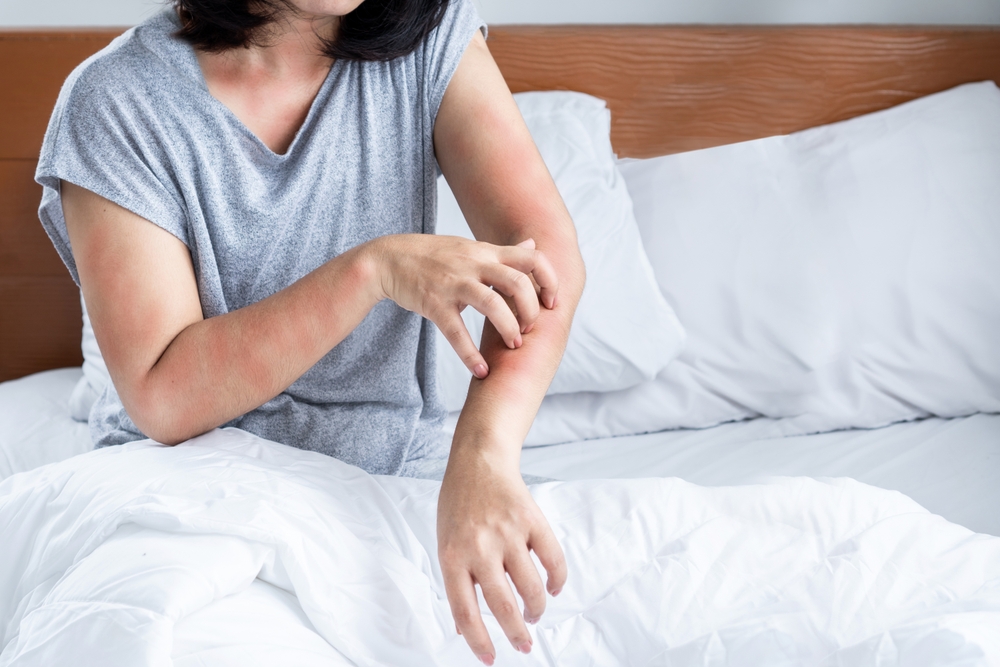

Itching and Irritation – Causes, Diagnosis, and Treatment at Emirates Hospitals Group
Itching and irritation are common skin concerns that can cause significant discomfort and impact daily life. These sensations may be caused by a variety of factors, ranging from mild skin conditions to more serious underlying health issues. Understanding the root cause of itching and irritation is crucial for finding effective treatments and achieving relief.
Causes of Itching and Irritation
- Dry Skin: One of the most common causes of itching, often worsened by weather conditions, dehydration, or harsh skincare products.
- Allergic Reactions: Allergies to food, medications, insect bites, or environmental factors (like pollen or dust) can lead to skin irritation and itching.
- Skin Conditions: Conditions like eczema, psoriasis, and dermatitis cause inflammation and itching of the skin.
- Infections: Fungal, bacterial, or viral infections, including athlete’s foot, impetigo, or chickenpox, can cause itching and irritation.
- Insect Bites: Mosquito bites, flea bites, or stings from other insects can trigger allergic reactions and localized itching.
- Hives (Urticaria): Raised, red, itchy welts on the skin that are often triggered by allergic reactions, stress, or certain medications.
- Contact Dermatitis: An allergic reaction to substances that come in contact with the skin, such as certain metals, plants (like poison ivy), or chemicals.
- Heat Rash: Blockage of sweat glands due to heat and humidity, leading to small, itchy bumps on the skin.
- Chronic Conditions: Conditions like liver disease, kidney disease, or diabetes can result in widespread itching, often due to toxins or imbalances in the body.
- Medications: Some medications, such as antibiotics, opioids, or blood pressure medications, may cause itching as a side effect.
- Hormonal Changes: Pregnancy, menopause, or hormonal imbalances can lead to skin irritation and itching.
- Psychological Factors: Stress, anxiety, or certain psychological conditions may contribute to sensations of itching or exacerbate existing conditions.
Diagnosis of Itching and Irritation
A thorough evaluation is essential to determine the cause of itching and irritation. The diagnostic process may include:
- Medical History: A review of lifestyle, allergies, medications, and any other symptoms to help identify potential causes of skin irritation.
- Physical Examination: A detailed skin examination to check for visible signs of allergic reactions, rashes, infections, or other skin conditions.
- Patch Testing: Used to identify specific allergens that may be causing contact dermatitis or skin reactions.
- Blood Tests: To rule out systemic conditions such as liver disease, kidney issues, or thyroid imbalances that could lead to itching.
- Skin Biopsy: A small sample of skin may be taken to examine tissue under a microscope for conditions like psoriasis or eczema.
- Allergy Testing: Skin tests or blood tests to determine specific allergies contributing to skin irritation.
Treatment for Itching and Irritation in Dubai
With prompt diagnosis and the right treatment plan, most cases of itching and irritation can be effectively managed. At Emirates Hospitals Group, our specialists offer comprehensive care to address the underlying causes of your skin irritation, providing personalized treatment options for optimal relief and comfort. Whether you’re dealing with dry skin, allergies, or more complex conditions, our team is dedicated to improving your skin health and overall well-being.
Treatment for itching and irritation depends on the underlying cause and severity of symptoms. Some common treatment options include:
- Topical Treatments:
- Antihistamines: Oral or topical antihistamines can reduce itching associated with allergies, hives, or insect bites.
- Corticosteroids: Topical steroids can help reduce inflammation and itching associated with eczema, psoriasis, or dermatitis.
- Calamine Lotion: A soothing lotion for relieving itching caused by insect bites, rashes, or minor skin irritations.
- Moisturizers: Emollients and hydrating creams can help restore moisture to dry, irritated skin, preventing further itching.
- Medications:
- Oral Antihistamines: To control itching caused by allergic reactions or hives.
- Oral Steroids: In severe cases of allergic reactions or skin conditions, oral corticosteroids may be prescribed to reduce inflammation.
- Antifungal or Antibacterial Medications: If an infection is the cause of itching, antifungal creams or oral antibiotics may be necessary.
- Immunosuppressive Medications: For chronic conditions like psoriasis or severe eczema, immunosuppressive drugs may be prescribed to control the immune response.
- Lifestyle Modifications:
- Avoiding Irritants: Identifying and avoiding triggers such as allergens, harsh soaps, or extreme temperatures can reduce irritation.
- Wearing Soft, Loose Clothing: Fabrics like cotton can reduce friction and irritation, especially in sensitive areas of the body.
- Hydrating the Skin: Using mild, fragrance-free moisturizers regularly can help protect the skin’s barrier and alleviate dryness and irritation.
- Phototherapy: Light therapy, or phototherapy, can be used for certain skin conditions like psoriasis, eczema, or chronic hives. This treatment involves controlled exposure to ultraviolet light to reduce inflammation and irritation.
- Allergy Treatments:
- Allergen Avoidance: Identifying and avoiding allergens that trigger skin reactions is crucial for managing allergic skin conditions.
- Allergy Shots (Immunotherapy): In some cases, allergy shots may help desensitize the immune system to specific allergens, reducing the frequency of allergic reactions.
- Psychological Support: In cases where itching is linked to psychological factors like stress or anxiety, counseling, and stress-management techniques may help improve symptoms.
Related Treatments
- Dry Eye Syndrome
- Liver Failure
- Hepatitis Treatment
- Autoimmune Liver Diseases
- Liver Cancer
- Diabetic Kidney Disease
- Hemorrhoids Treatment Clinic
Request an appointment
Please complete the details and we will book you shortly.
